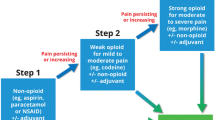Abstract
This study investigated the relation of cognitive coping and catastrophizing to acute postoperative pain and analgesic use. Fifty-nine women who had just undergone breast cancer surgery rated their pain on 3 consecutive days and completed a self-report measure of cognitive coping and catastrophizing prior to hospital discharge. Analgesic use over the 3-day period was tabulated from pharmacy records. Based on prior research, it was hypothesized that increased catastrophizing and decreased use of cognitive coping strategies would be associated with greater pain and analgesic use. Results partially confirmed these hypotheses. Catastrophizing, but not cognitive coping, was associated with individual differences in pain intensity and analgesic use. Additional analyses indicated that age was a significant predictor of both catastrophizing and postoperative pain. Specifically, younger patients were more likely to catastrophize and to report increased postoperative pain. Theoretical and clinical implications of these findings are discussed.
Similar content being viewed by others
References
Brown, G. K., and Nicasio, P. M. (1987). Development of a questionnaire for the assessment of active and passive coping strategies in chronic pain patients.Pain 31: 53–64.
Butler, R. W., Damarin, F. L., Beaulieu, C., Schwebel, A. I., and Thorn, B. E. (1989). Assessing cognitive coping strategies for acute postsurgical pain.Psychol. Assess. 1: 41–45.
Chaves, J. F., and Brown, J. M. (1987). Spontaneous cognitive strategies for the control of clinical pain and stress.J. Behav. Med. 10: 263–276.
Estlander, A. M., and Harkapaa, K. (1989). Relationships between coping strategies, disability and pain levels in patients with chronic low back pain.Scand. J. Behav. Ther. 18: 59–69.
Fernandez, E., and Turk, D. C. (1989). The utility of cognitive coping strategies for altering pain perception: a meta-analysis.Pain 38: 123–135.
Flor, H., and Turk, D. C. (1988). Chronic back pain and rheumatoid arthritis: Predicting pain and disability from cognitive variables.J. Behav. Med. 11: 251–265.
Flor, H., Behle, D. J., and Birbaumer, N. (1993). Assessment of pain-related cognition in chronic pain patients.Behav. Res. Ther. 31: 63–73.
Heyneman, N. E., Fremouw, W. J., Gano, D., Kirkland, F., and Heiden, L. (1990). Individual differences in the effectiveness of different coping strategies for pain.Cog. Ther. Res. 14: 63–77.
Jacobsen, P. B., Bovbjerg, D. H., and Redd, W. H. (1993). Anticipatory anxiety in women receiving chemotherapy for breast cancer.Health Psychol. 12: 469–475.
Jacobsen, P. B., Massie, M. J., Kinne, D. W., and Holland, J. C. (1994). Hypnotic efficacy and safety of triazolam administered during the postoperative period.Gen. Hosp. Psychiat. 16: 419–425.
Jamison, K., Wellisch, D. K., and Pasnau, R. O. (1978). Psychological aspects of mastectomy. I. The woman's perspective.Am. J. Psychiat. 135: 432–436.
Keefe, F. J., Brown, G. K., Wallston, K. A., and Caldwell, D. S. (1989). Coping with rheumatoid arthritis pain: Catastrophizing as a maladaptive strategy.Pain 37: 51–56.
Keefe, F. J., Crisson, J., Urban, B. J., and Williams, D. A. (1990). Analyzing chronic low back pain: The relative contribution of pain coping strategies.Pain 40: 293–302.
Metzger, L. F., Rogers, T. F., and Bauman, L. J. (1983). Effects of age and marital status on emotional distress after a mastectomy.J. Psychosoc. Oncol. 1: 17–33.
Northouse, L. L., and Swain, M. A. (1987). Adjustment of patients and husbands to the initial impact of breast cancer.Nurs. Res. 36: 221–225.
Patt, R. B., Szalados, J. E., and Wu, C. L. (1993). Pharmacotherapeutic guidelines. In Patt, R. B. (ed.),Cancer Pain, J. B. Lippincott, Philadelphia.
Rosentiel, A. K., and Keefe, F. J. (1983). The use of coping strategies in chronic low-back pain patients: Relationship to patient characteristics and current adjustment.Pain 17: 33–44.
Spinhoven, P., Ter Kuile, M. M., Linssen, A. C. G., and Gazendam, B. (1989). Pain coping strategies in a Dutch population of chronic low back pain patients.Pain 37: 77–84.
Tan, S. Y. (1982). Cognitive and cognitive-behavioral methods of pain control: A selective review.Pain 12: 201–228.
Turk, D. C., and Rudy, T. E. (1986). Assessment of cognitive factors in chronic pain: A worthwhile enterprise?J. Cons. Clin. Psychol. 54: 760–768.
Turk, D. C., and Rudy, T. E. (1992). Cognitive factors and persistent pain: A glimpse into Pandora's Box.Cog. Ther. Res. 16: 99–122.
Turk, D. C., Meichenbaum, D., and Genest, M. (1983).Pain and Behavioral Medicine: A Cognitive-Behavioral Perspective, Guilford, New York.
Turner, J. A., and Clancy, S. (1986). Strategies for coping with chronic low back pain: Relationship to pain and disability.Pain 24: 355–362.
Author information
Authors and Affiliations
Rights and permissions
About this article
Cite this article
Jacobsen, P.B., Butler, R.W. Relation of cognitive coping and catastrophizing to acute pain and analgesic use following breast cancer surgery. J Behav Med 19, 17–29 (1996). https://doi.org/10.1007/BF01858172
Accepted:
Issue Date:
DOI: https://doi.org/10.1007/BF01858172




